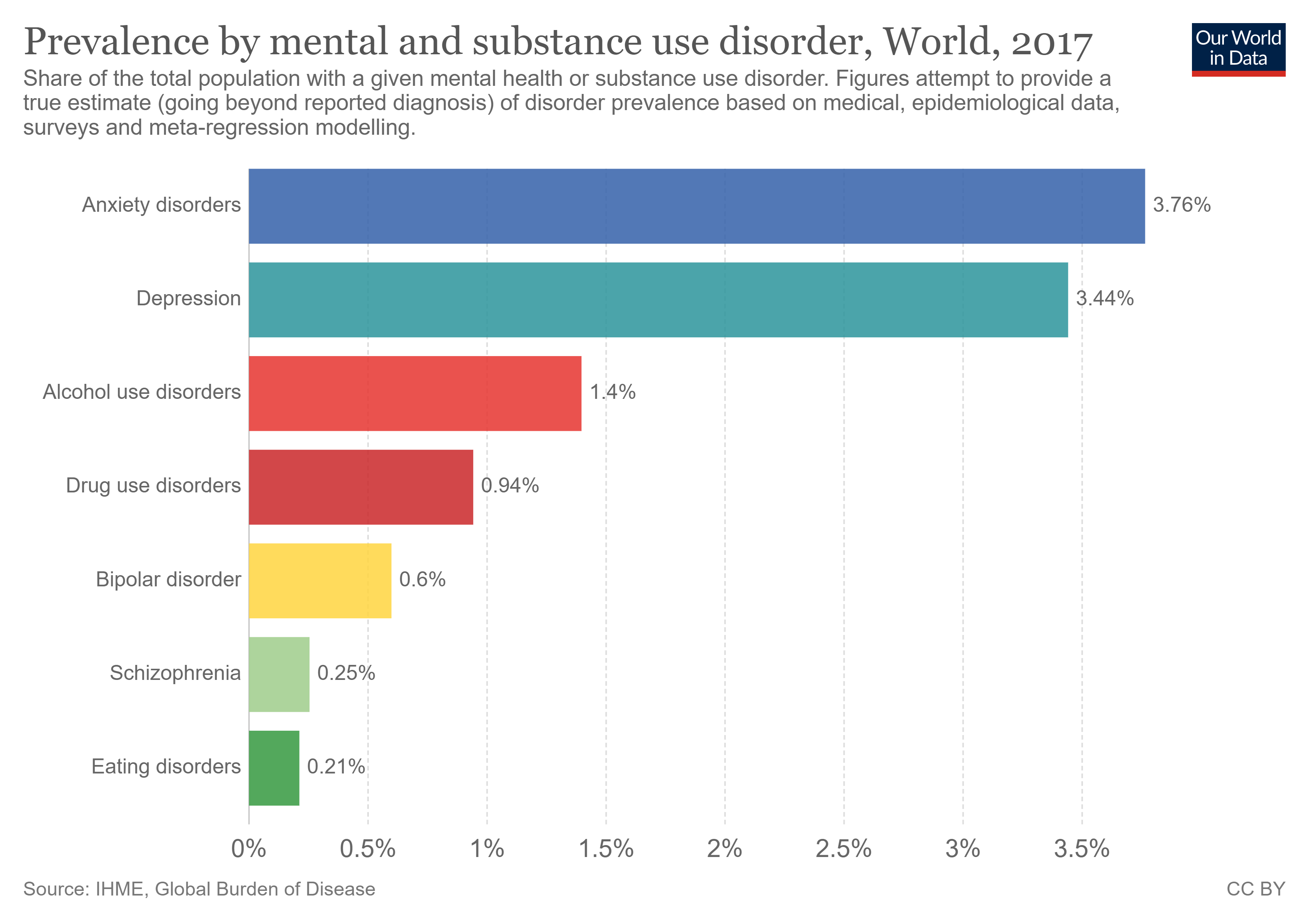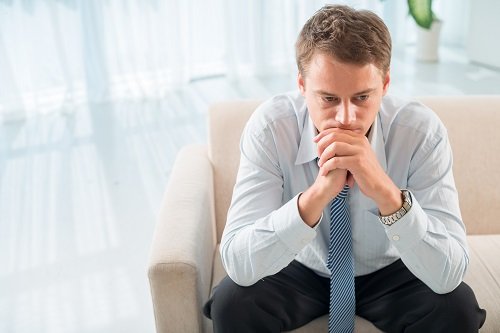People are feeling worried, stressed and anxious in relation to the Coronavirus (COVID-19).
Stuck indoors, worried about an uncertain future, concerned for their family or friends.
It is understandable that during times like this that people may be feeling anxious and overwhelmed by the constantly changing alerts and media coverage regarding the spread of the virus.
The pandemic is a stressful situation for anyone to contend with.
For the estimated one-in-ten people in the world who already live with a mental health disorder, it’s an even tougher time.

Mental health disorders are widespread all around the world
Image: Our World in Data
In the UK, the Duke and Duchess of Cambridge, who have been raising awareness of mental health issues for years, have backed a new campaign by Public Health England to encourage people to take care of their minds as well as their bodies during the outbreakWhile the British government is providing an additional £5 million ($6.2 million) in funding for mental health charities, the campaign also outlines some simple steps that could help many people stay calm and positive.
The 14 recommendations, condensed lightly from the full version, are:
Consider how to connect with others: Video calls with friends and family can help beat isolation. 
Help and support others: Think about how you could help those around you – it could make a big difference to them and can make you feel better too.
Talk about your worries: Remember that this is a difficult time for everyone and sharing how you are feeling and the things you are doing to cope with family and friends can help them too.
Look after your physical wellbeing: Try to eat healthy, well-balanced meals, drink enough water, exercise inside where possible and outside once a day (keeping the recommended 2 metres from others as outlined in the social distancing guidance and if this is in accordance with government advice in your country).
Look after your sleep: Try to maintain regular sleeping patterns and keep good sleep hygiene practices – like avoiding screens before bed, cutting back on caffeine and creating a restful environment.
Try to manage difficult feelings: Try to focus on the things you can control, including where you get information from and actions to make yourself feel better prepared.
The Every Mind Matters page on anxiety and NHS mental wellbeing audio guides provide further information on how to manage anxiety.
Manage your media and information intake: 24-hour news and constant social media updates can make you more worried. It may help to only check the news at set times or limit yourself to a couple of checks a day. 
Get the facts: Gather high-quality information that will help you to accurately determine your own or other people’s risk of contracting coronavirus (COVID-19) so that you can take reasonable precautions.
Think about your new daily routine: Think about how you can adapt and create positive new routines – try to engage in useful activities (such as cleaning, cooking or exercise) or meaningful activities (such as reading or calling a friend). You might find it helpful to write a plan for your day or your week.
Do things you enjoy: If you can’t do the things you normally enjoy because you are staying at home, try to think about how you could adapt them, or try something new. There are lots of free tutorials and courses online.
Set goals: Setting goals and achieving them gives a sense of control and purpose – think about things you want or need to do that you can still do at home.
Keep your mind active: Read, write, play games, do crossword puzzles, sudokus, jigsaws or drawing and painting. Find something that works for you.
Take time to relax and focus on the present: Relaxation techniques can help some people to deal with feelings of anxiety. For useful resources see Every Mind Matters and NHS’ mindfulness page.
If you can, once a day get outside, or bring nature in: Spending time in green spaces can benefit both your mental and physical wellbeing. If you can’t get outside you can try to get these positive effects by spending time with the windows open, or arranging space to sit and see a view (if possible) and get some natural sunlight.
Mental health and wellbeing during the Coronavirus COVID-19 outbreak in Australia
In Australians the Lifeline telephone, text and webchat services will continue as normal throughout the COVID-19 crisis.
To contact Lifeline:
Phone: 13 11 14 (24 hours/7 days)
Text: 0477 13 11 14 (6pm – midnight AEDT, 7 nights)
Chat online: https://www.lifeline.org.au/crisis-chat (7pm – midnight, 7 nights)
Some suggestions from Lifeline:
Manage your exposure to media coverage as this can increase feelings of fear and anxiety. Be mindful of sources of information and ensure you are accessing good quality and accurate information. We have provided some links below. 
Follow a “calm yet cautious” approach – do you best to remain calm and be mindful not to contribute to the widespread panic that can hinder efforts to positively manage the outbreak. Ensure you are following directives issued by the government, medical advice and observe good hygiene habits.
Show compassion and kindness to one another – these times of fear, isolation (both physical and social) and uncertainty are when it is most important that we strengthen our sense of community by connecting with and supporting each other. Remind ourselves that we can manage this much better together in solidarity, and that COVID-19 doesn’t discriminate – it can affect anyone regardless of age, gender, nationality or ethnicity.
Actively manage your wellbeing by maintaining routines where possible, connect with family and friends (even if not in person), staying physically active, eating nutritious foods and seeking additional support by contacting Lifeline or further professional support as required.
Strategies to cope with social distancing, self-isolation or quarantine
Going into a period of social distancing, self-isolation or quarantine may feel daunting or overwhelming, and can contribute to feelings of helplessness and fear. In addition to the above, we encourage the following;
Perspective – try to see this time as unique and different, not necessarily bad, even if it something you didn’t necessarily choose
Connection – think of creative ways to stay connected with others, including social media, email and phone
Be generous to others – giving to others in times of need not only helps the recipient, it enhances your wellbeing too. Is there a way to help others around you?
Stay connected with your values. Don’t let fear or anxiety drive your interactions with others. We are all in this together!
Daily routine – create a routine that prioritises things you enjoy and even things you have been meaning to do but haven’t had enough time. Read that book, watch that show, take up that new hobby.
Try to see this as a new and unusual period that might even have some benefits.
Limit your exposure to news and media. Perhaps choose specific times of day when you will get updates, and ensure they are from reputable and reliable sources.
Staying connected through the COVID-19 crisis
Research after the SARS pandemic in Hong Kong in 2008, provides evidence of the significance of connection through epidemics. It found that residents in Hong Kong experienced increased social connectedness, which offset the negative mental health impacts of the pandemic.
As connection is so important during this time, here are some tips on staying connected to others during this time. Remember – we are all in this together.
If there is someone you think may struggle through social isolation, it is important to reach out to them and let them know you care:
Call them to check on their welfare 
Send an email
Leave a note under their door
Don’t underestimate the power you have to offer hope to another person.
We encourage people to get creative with how they interact, here are some ways to stay connected if self-isolating:
Set up a gratitude tree – where every member posts a message or sends a text to other members to share something they are grateful for.
Find a buddy, or group of, to set daily challenges with. These could include a healthy habit, a mindful practice, a creative pursuit. Be sure to encourage and check in daily to stay motivated.
Set dates and times to watch the same TV shows/movies with someone and message each other your thoughts along the way… kind of like Goggle Box but you’re not sharing the couch!
If your local community has one, join its social media group! This will keep you up to date with what’s going on directly around you. It may also include ways you can perhaps reach out and connect with someone less fortunate than you and ways to assist them.
Where to go for support
It is extremely important to seek out help if you feel you need it. We want to remind everyone that Lifeline is here to offer support to you and listen. Lifeline are committed to ensuring our services continue as normal during this time.
13 11 14 will continue to be operating 24 hours a day, 7 days a week
Lifeline Text 0477 13 11 14 will continue to operate 6pm – midnight (AEDT), 7 nights a week
Lifeline webchat will continue to operate 7pm – midnight (AEDT), 7 nights a week
Kids Helpline – for children that may need support 1800 55 1800 https://kidshelpline.com.au
Beyond Blue – 1300 22 4636 https://beyondblue.org.au
NOW READ:
Coronavirus crisis: I have no idea what will happen to property prices!
Brisbane property market – how will Coronavirus affect it?
Read more: propertyupdate.com.au


